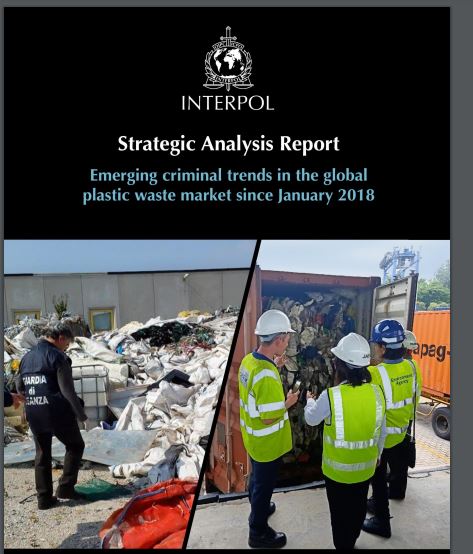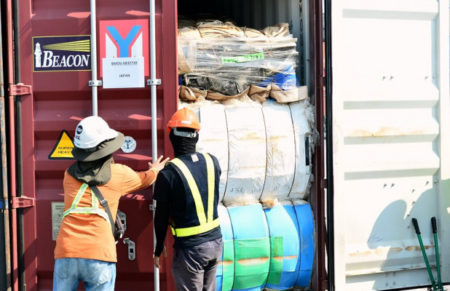
The report notes that since 2018, when China introduced import restrictions on plastic waste, there has been a “considerable increase” in illegal waste shipments from Europe and North America.
This has been primarily rerouted to South-East Asia and Eastern Europe, often via multiple transit countries “to camouflage the origin of the waste shipment”, said Interpol.
Based on open sources and criminal intelligence from 40 countries, including the UK, the report provides a “comprehensive global picture of emerging trafficking routes and crime threats in the plastic waste market”, and recommends tailored enforcement responses.
It can be seen in full here. Funded by the Life Smart Waste Project, a “partnership between key European bodies addressing waste crime”, participants include the Scottish Environmental Protection Agency. Interpol is the ‘International Criminal Police Organization’ and is an inter-governmental organisation.
Markets
The report states that China gave “necessary notice” of its impending ban to the World Trade Organization in July 2017, before the scheme was rolled out in January 2018.
However this also “may have opened the door to illegal business opportunities”, according to Interpol, which can occur at any of the “various stages of the value chain of plastic waste processing”.
Since then there has been a continuous re-routing of waste shipments to emerging import countries, primarily located in South and South-East Asia, and to a lesser extent in Eastern Europe.
Interpol says that 48% of countries which took part in the report reported an increase in illegal plastic exports since then but this didn’t include the UK which said this remained “unchanged”.
Landfill

As a result of the increase in illegal plastic exports, alternative export countries such as Malaysia, Poland and Vietnamn have experienced “a significant increase in disposal in illegal landfills and in waste fires, both accidental and deliberate”.
This is used by illegal operators as a way to “cheaply deal with large volumes of untreated domestic waste previously exported to China”.
The sudden and sharp increase in imported waste volumes into South-East Asia has also generated a burden on the limited recycling capacity of emerging import countries, Interpol says.
Ports
Requests from South and South East Asian countries to repatriate illegal containers of plastic waste have increased since 2018, Interpol says, “but remain a long and challenging process”.
As a consequence, the report notes that containers have been piling up in South-East Asian ports and sometimes re-exported illegally to neighbours in the region, transferring the burden of dealing with the illegal waste.
As more countries begin to introduce import restrictions, Interpol says new destinations for illegal plastic waste shipments will likely be found in South-East Asian countries whichare currently minor importers and with very limited waste management and waste enforcement capacities.

It is possible that other destinations will be found in Africa and Latin America, however more data from those regions is necessary to assess this risk further.
Criminal gangs
The report points to a link between crime networks and legitimate pollution management businesses which are used as a cover for illegal operations, with criminals often resorting to financial crime and document forgery to carry out their global operations
Methods being used by illegal exporters include:
- Plastic waste shipments falsely declared as destined for recovery, or misdeclared as raw material
- Illegal shipped contaminated plastic waste is concealed in the container by being placed behind the “clean” plastic waste that is declared on shipping documents
- Misdeclaration of waste supporting tax evasion
- Misdeclaration of the final destination of plastic waste shipments, using a transit country in a free trade zone
Interpol says it has identified that the infiltration of organised gangs into the waste sector, which usually happens through legitimate businesses as a cover for illegal operations, with regular involvement of financial crimes and various frauds, especially documents forgery.
Future risks
This report recommends a move towards proactive waste enforcement, by scanning risks early and addressing them before they turn into actual threats.
“Collaboration between regulators, inspection bodies, enforcement officers, and the private waste sector is essential to address those risks”
The following risks were identified to present a likely to almost certain impact on the illegal trends directly or indirectly related to the plastic waste sector, in the near future
- The re-routing of illegal trade to new and more vulnerable countries following upcoming restrictions on plastic waste imports
- The increase in illegal plastic disposal if the Basel Convention amendment on plastic waste trade is not properly implemented starting from 2021
- New criminal activities related to banned plastic items, photovoltaic panels waste, lead batteries and lithium batteries-related waste
“Collaboration between regulators, inspection bodies, enforcement officers, and the private waste sector is essential to address those risks and achieve appropriate governance of the waste sector,” interpol said.
Interpol added that its global pollution enforcement team works with expert agencies in 194 countries to detect and disrupt pollution crime and dismantle the groups behind it.
22 October, Waste Crime Conference, Virtual Online Event
Waste Crime will be on the agenda at the Virtual Waste Crime Conference, to be held on 22 October. More information can be found HERE. The event is organised by letsrecycle.com parent company, the Environment Media Group.









Subscribe for free